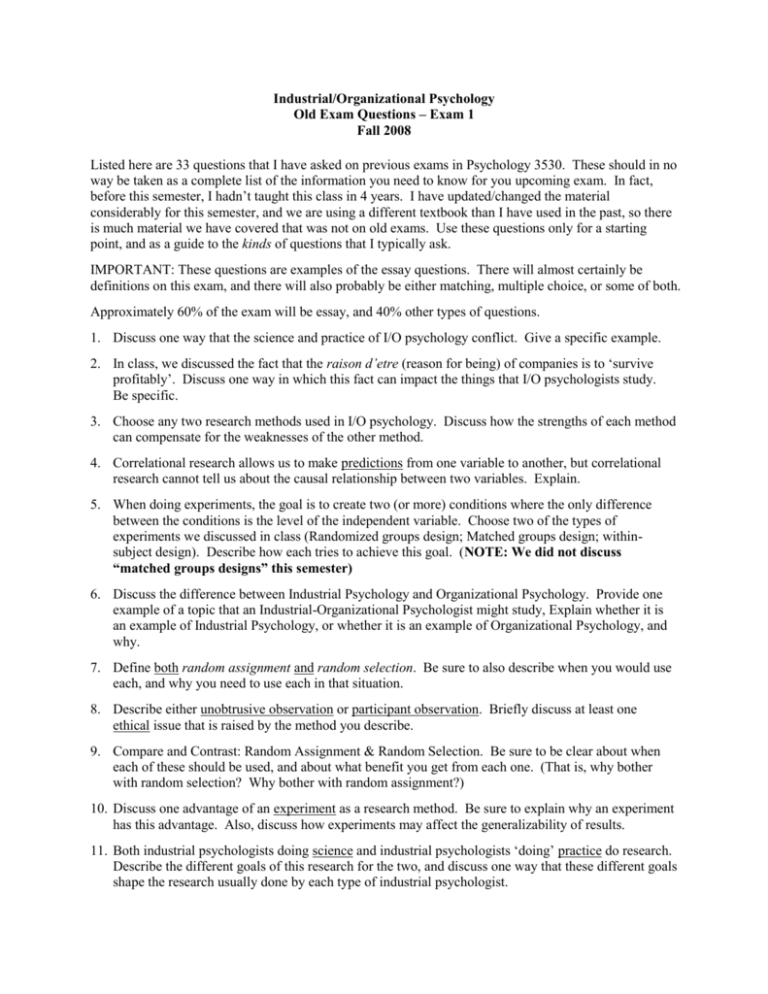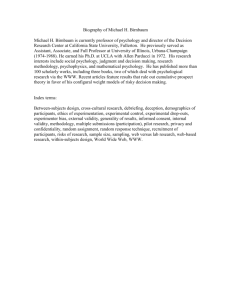Industrial/Organizational Psychology
advertisement

Industrial/Organizational Psychology Old Exam Questions – Exam 1 Fall 2008 Listed here are 33 questions that I have asked on previous exams in Psychology 3530. These should in no way be taken as a complete list of the information you need to know for you upcoming exam. In fact, before this semester, I hadn’t taught this class in 4 years. I have updated/changed the material considerably for this semester, and we are using a different textbook than I have used in the past, so there is much material we have covered that was not on old exams. Use these questions only for a starting point, and as a guide to the kinds of questions that I typically ask. IMPORTANT: These questions are examples of the essay questions. There will almost certainly be definitions on this exam, and there will also probably be either matching, multiple choice, or some of both. Approximately 60% of the exam will be essay, and 40% other types of questions. 1. Discuss one way that the science and practice of I/O psychology conflict. Give a specific example. 2. In class, we discussed the fact that the raison d’etre (reason for being) of companies is to ‘survive profitably’. Discuss one way in which this fact can impact the things that I/O psychologists study. Be specific. 3. Choose any two research methods used in I/O psychology. Discuss how the strengths of each method can compensate for the weaknesses of the other method. 4. Correlational research allows us to make predictions from one variable to another, but correlational research cannot tell us about the causal relationship between two variables. Explain. 5. When doing experiments, the goal is to create two (or more) conditions where the only difference between the conditions is the level of the independent variable. Choose two of the types of experiments we discussed in class (Randomized groups design; Matched groups design; withinsubject design). Describe how each tries to achieve this goal. (NOTE: We did not discuss “matched groups designs” this semester) 6. Discuss the difference between Industrial Psychology and Organizational Psychology. Provide one example of a topic that an Industrial-Organizational Psychologist might study, Explain whether it is an example of Industrial Psychology, or whether it is an example of Organizational Psychology, and why. 7. Define both random assignment and random selection. Be sure to also describe when you would use each, and why you need to use each in that situation. 8. Describe either unobtrusive observation or participant observation. Briefly discuss at least one ethical issue that is raised by the method you describe. 9. Compare and Contrast: Random Assignment & Random Selection. Be sure to be clear about when each of these should be used, and about what benefit you get from each one. (That is, why bother with random selection? Why bother with random assignment?) 10. Discuss one advantage of an experiment as a research method. Be sure to explain why an experiment has this advantage. Also, discuss how experiments may affect the generalizability of results. 11. Both industrial psychologists doing science and industrial psychologists ‘doing’ practice do research. Describe the different goals of this research for the two, and discuss one way that these different goals shape the research usually done by each type of industrial psychologist. 12. Compare and contrast: Industrial Psychology and Organizational Psychology. 13. What are inferential statistics? What are they used for? How do they differ from descriptive statistics? 14. In class, we discussed the need to generalize our findings from a sample to a population. Explain what this means, what types of generalization might be relevant in I/O psychology, and one method that might be used to increase our likelihood of being able to accurately make such a generalization. 15. Discuss one strength and one weakness of the participant observer method of research. 16. Objective measurement requires intersubjectivity. Define this term, and describe one step that researchers could take to try and enhance the intersubjectivity of their measures. 17. Discuss the relationship between samples and populations. Be sure to describe how this relates to the notion of generalizability. Give an example. (Extra points will be given if your example does not refer to generalizing to different people). 18. Choose either: Experiements or Survey Research. For which ever one you choose, explain why it does or does not allow you to know about prediction and causality. 19. Briefly describe the goal of inferential statistics. How is this different from the goal of descriptive statistics? 20. Discuss one ethical issue that affects the work of I/O psychologists in practice, and one ethical issue that affects the work of I/O psychologists in science. For each, briefly present some of the problems or issues involved. 21. Discuss one factor that may limit the ability of a research participant to provide informed consent in research in I/O psychology. Is the problem you discuss particularly serious for I/O psychology, or does it apply to all psychology research about equally? 22. Define construct validity. Briefly discuss one method used to determine if a measure has construct validity. 23. Describe one method of using control to solve the problem of confounding in research. 24. Suppose a researcher is interested in whether or not music causes people to be more productive. She does a study where she randomly selects a group of workers and measures their productivity on a new task. Then she begins playing music in the workplace, and once again measures their productivity on the task. Answer the following questions. Be as specific as possible. (1) What is the research design being used? (2) What, if anything, is the independent variable? (3) What, if anything, is the dependent variable? (4) Do you see any problems with this research design? 25. Discuss at least two things that may limit the ability of an I/O psychologist from using the best available solution to solve a problem in the workplace. 26. Discuss at least one way in which the practice and science aspects of I/O psychology interact or affect one another, and one way in which they conflict with one another. 27. In class we mentioned that I/O psychologists frequently take the perspective of management. Discuss how this affects the research process of I/O psychologists. 28. How does the use of deception affect the ethics of research? (Be Specific). 29. An important step in planning a research study is to examine the risk-benefit tradeoff of the research. Describe what this is, and discuss what kinds of risks and benefits are relevant. 30. Describe three kinds of reliability. For each, briefly explain how you would test to see if a measurement has that kind of reliability. 31. Describe one method of using control to solve the problem of confounding in research. 32. In class I said that “face validity” isn’t really validity at all. Explain. 33. If one variable causes a change in another variable, then the two variables will correlate. However, just because two variables correlate does not mean that one variable causes a change in the other. Explain both of these statements.






